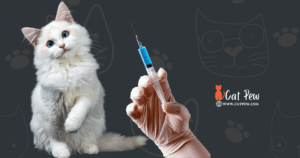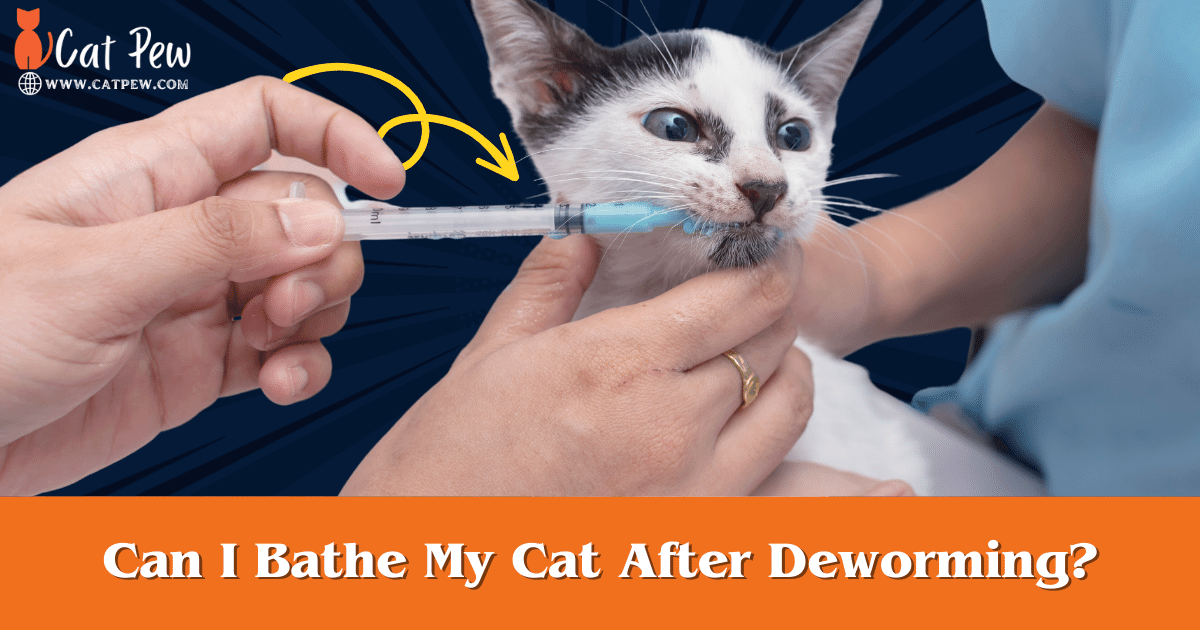Can I Bathe My Cat After Deworming?
Yes, you can bathe your cat after deworming without any issues. However, it is important to wait for a specific period before giving your cat a bath post-deworming to ensure the effectiveness of the treatment.
Deworming medications are usually administered orally, and the period required for the medication to take effect and eliminate the worms may differ depending on the type of dewormer used. After the waiting period has passed, you can bathe your cat following the usual methods and practices for cat bathing.
It’s important to consider your cat’s comfort and safety during the bathing process to make it a positive experience for them.
Understanding The Deworming Process

After deworming your cat, it is best to wait a few days before bathing them. This allows time for the medication to take effect and reduces any potential irritation or discomfort. Always consult your veterinarian for specific instructions regarding the deworming process and bath timing.
Deworming your cat is an essential aspect of their overall health and well-being. Just like humans, cats are susceptible to worms that can cause various health issues. Therefore, understanding the deworming process is crucial in providing proper care for your feline friend. In this article, we will delve into the importance of deworming for cats, common types of cat worms, and how deworming medication works.
Importance Of Deworming For Cats
Deworming plays a vital role in maintaining your cat’s health and preventing potential complications. While you may not see visible signs of worms in your cat, they can still be present and silently wreak havoc on their internal systems. Here are a few reasons why deworming is crucial:
- Preventing the spread of parasites: Cats are known for their curious nature and may come into contact with external parasites like fleas, which can carry worms. Deworming helps minimize the risk of infestations caused by these parasites.
- Protecting your cat’s health: Worms in cats can lead to a range of health problems, such as weight loss, diarrhea, vomiting, anemia, and even death in severe cases. Regular deworming helps eliminate these parasites and maintain your cat’s overall well-being.
- Shielding humans from potential infection: Certain types of cat worms can be transmitted to humans. By regularly deworming your cat, you reduce the risk of transferring these parasites to yourself and your family members.
Common Types Of Cat Worms
Cat worms can vary in size, shape, and even the symptoms they cause. It is essential to be aware of the common types of worms that can affect your feline companion. These include:
| Common Types of Cat Worms | Symptoms |
|---|---|
| Roundworms (Toxocara cati) | Weight loss, potbelly appearance, diarrhea, vomiting, coughing |
| Tapeworms (Dipylidium caninum) | Rice-like segments in feces, scooting, excessive licking of the anal area |
| Hookworms (Ancylostoma tubaeforme) | Dark or bloody diarrhea, anemia, weakness, poor growth in kittens |
| Heartworms (Dirofilaria immitis) | Coughing, difficulty breathing, decreased appetite, weight loss |
How Deworming Medication Works
Deworming medication offers an effective solution to combat these pesky parasites. The medication typically contains active ingredients that target specific worms. Upon administering the medication to your cat, it begins to work in the following ways:
- Killing and eliminating adult worms: The medication helps kill the adult worms present in your cat’s intestinal tract. These dead worms are then eliminated through the feces.
- Preventing worm larvae from developing: Some deworming medications have additional benefits, such as preventing the development of worm larvae. This helps break the life cycle of the worms and reduces the risk of re-infestation.
- Offering broad-spectrum protection: Certain deworming medications cover a wide range of parasites, offering your cat comprehensive protection against various types of worms.
Note: It is important to follow the recommended dosage and schedule provided by your veterinarian when administering deworming medication to your cat. They can guide you in choosing the right medication and ensure it is safe for your cat’s specific needs.
Aftercare Tips For Deworming Your Cat

Deworming is crucial to pet care to remove harmful parasites from your cat’s body. However, following up with proper aftercare to maintain your cat’s health is essential. After the deworming treatment, ensure that your cat has access to clean water and nutritious food to aid in its recovery. You must monitor your cat for any signs of discomfort or adverse reactions, such as vomiting or diarrhoea, and consult your veterinarian if needed.
During the post-deworming period, try to minimize stress on your cat by providing a calm and comfortable environment at home. Keep an eye on your cat’s behaviour and appetite, as these can be indicators of its well-being after the treatment. Additionally, maintain good hygiene practices for your cat and its living area to prevent re-infestation.
Regularly check for any lingering signs of worms in your cat’s faeces or fur, which may indicate the need for further intervention. Finally, adhere to any additional instructions your veterinarian provides regarding follow-up care or future preventative measures against parasites for your beloved feline friend.
Scheduling A Follow-up Appointment
Once your cat has been dewormed, it’s crucial to schedule a follow-up appointment with your veterinarian. This allows them to assess the effectiveness of the deworming treatment and check if your cat requires any additional medication or dosage adjustments. Regular check-ups will help ensure that all parasites are successfully eliminated from your cat’s system, promoting their overall health and well-being.
Monitoring Your Cat For Side Effects
While deworming is generally safe, some cats may experience mild side effects. It’s important to keep a close eye on your cat after the treatment. Monitor for any unusual behavior, such as excessive lethargy, appetite loss, vomiting, or diarrhea. If you notice any concerning symptoms, contact your veterinarian immediately. Timely intervention can help address any potential complications and ensure that your cat receives appropriate care.
Maintaining A Clean Living Environment
After deworming your cat, it’s crucial to maintain a clean living environment to prevent re-infestation. Parasite eggs can survive in your cat’s bedding, litter box, or other surfaces, leading to a potential infestation. To minimize this risk, wash your cat’s bedding thoroughly, disinfect the litter box, and clean all surfaces where your cat spends time. Regularly vacuum your home and wash any fabrics your cat comes into contact with. A clean living environment helps minimize the chances of your cat getting re-infected and promotes a healthy recovery process.
By following these aftercare tips, you can ensure that your cat receives the appropriate care and support post-deworming. Remember, always consult your veterinarian for expert advice tailored to your cat’s specific needs.
Can I Bathe My Cat After Deworming?

You may be wondering whether it is safe to bathe your cat after deworming. Deworming is an important part of your cat’s healthcare routine, as it helps eliminate any internal parasites that may be affecting their health. While bathing your cat after deworming is generally safe, there are a few factors to consider before proceeding with the bath. Here, we will discuss these factors, the ideal timing for bathing after deworming, and safe bathing techniques to ensure your cat’s comfort and well-being.
Factors To Consider Before Bathing Your Cat
Befobathing your catch after deworming, there are a few things to keep in mind. These factors will help ensure that the bath is safe and effective:
- Health condition: Assess your cat’s overall health condition after deworming. If they are showing any signs of discomfort, such as vomiting or diarrhea, it is advisable to wait until they have fully recovered before bathing them.
- Veterinary recommendations: Consult with your veterinarian to ensure that bathing your cat after deworming is appropriate based on their specific health needs and the type of dewormer used.
- Time since deworming: Allow some time to pass after deworming before bathing your cat. This will give the dewormer enough time to work effectively and eliminate the parasites. Typically, it is recommended to wait at least 24 to 48 hours before bathing your cat.
Timing The Bath After Deworming
The timing of the bath after deworming is crucial to ensure the effectiveness of the dewormer and your cat’s comfort during the process. Here is a general guideline for timing the bath:
- Wait 24 to 48 hours: After administering the deworming treatment, give your cat a few days to allow the medication to work and eliminate the parasites.
- Observe for side effects: Monitor your cat for any potential side effects of the dewormer. If they are displaying any adverse reactions, it is important to consult with your veterinarian before bathing them.
- Check for healing wounds: If your cat had any wounds or surgeries related to the deworming process, ensure that they have healed completely before subjecting them to a bath.
Safe Bathing Techniques For Cats
Bathing your cat after deworming requires careful attention to their comfort and safety. Follow these safe bathing techniques to make the experience as stress-free as possible:
- Use cat-friendly shampoos: Choose a mild and cat-specific shampoo that is free of harsh chemicals and fragrances. This will minimize the risk of skin irritation and allergies.
- Prepare the bathing area: Set up a warm and quiet bathing area beforehand, ensuring that all necessary supplies, such as towels, shampoo, and a gentle brush, are within reach.
- Handle with care: Be gentle and patient while handling your cat during the bath. Use slow, calm movements and offer treats or praise to keep them relaxed.
- Avoid sensitive areas: Take extra care to avoid getting water or shampoo in your cat’s ears, eyes, and nose. Use a damp cloth or cotton ball for these sensitive areas.
- Drying and comforting: After the bath, gently towel-dry your cat and provide a warm and cozy place for them to relax until they are completely dry.
By considering these factors, timing the bath appropriately, and using safe bathing techniques, you can ensure a positive bathing experience for your cat after deworming. Remember to always prioritize your cat’s well-being and consult with your veterinarian if you have any concerns or questions.
Alternative Cleaning Methods For Deworming

Be mindful of their comfort and avoid unnecessary stress during this crucial period.
After giving your cat deworming medication, keeping them clean without using traditional bathing methods is essential. Instead of immersing your feline in water, consider using gentle wipes designed for cats to remove dirt or residue from their fur. These wipes are a convenient and stress-free way to maintain your cat’s hygiene without causing excess moisture that may interfere with deworming.
Another alternative cleaning method is using a dry shampoo made for cats. This option allows you to effectively cleanse your cat’s fur without the need for water, reducing the risk of exposure to moisture that may compromise the efficacy of the deworming medication. By choosing these alternative cleaning methods, you can provide proper care for your cat while helping them stay comfortable and healthy during their recovery from deworming treatment.
After successfully deworming your beloved furry friend, you may wonder how to keep them clean and prevent infestation. While bathing is not recommended immediately after deworming, there are alternative cleaning methods that you can explore to maintain your cat’s hygiene. This article will discuss using dry shampoos or wipes for hygiene, regular grooming practices for cleanliness, and tips for preventing reinfestation after deworming.
Using Dry Shampoos Or Wipes For Hygiene
Dry shampoos and wipes can be a convenient and effective way to keep your cat clean between baths. These products are specifically designed to eliminate odors, remove dirt, and freshen up your cat’s coat without the need for water.
When using dry shampoos, simply apply a small amount to your hands and gently massage it into your cat’s fur. This will help to absorb excess oil and dirt, leaving their coat looking and smelling fresh. Remember to choose a dry shampoo that is specifically formulated for cats and avoid using any products that contain harmful chemicals or fragrances.
Similarly, if you prefer using wipes, make sure to choose ones that are cat-friendly and suitable for their delicate skin. Gently wipe their fur with the wipes, paying special attention to areas that are prone to dirt and odor, such as their paws and hindquarters.
Regular Grooming Practices For Cleanliness
Grooming is essential for keeping your cat healthy and clean. Regular brushing is particularly important as it helps to get rid of loose hair, dirt, and other debris from their fur. This not only keeps your cat looking tidy but also prevents hairballs and improves their overall well-being.
- Brushing also stimulates blood circulation in the skin, promoting a healthy coat. It can help in the early detection of lumps or skin issues that might need attention too. Additionally, long-haired cats especially benefit from regular brushing to prevent uncomfortable matting and tangles.
- Proper grooming can also reduce the amount of shedding around your home and minimize allergens in the air, which can be beneficial for both you and your cat’s respiratory health.
- Remember to use gentle brushes suitable for cats’ sensitive skin, and make sure to provide treats or rewards afterward to create a positive association with grooming. Regular grooming sessions help strengthen the bond between you and your feline friend while keeping them healthy at the same time.
- Start by investing in a high-quality brush or comb that is suitable for your cat’s coat type. Long-haired cats may require a brush with longer bristles to detangle their fur, while short-haired cats may benefit from a brush with shorter bristles to reduce shedding. Remember to groom your cat in a quiet and comfortable environment to ensure they feel calm and relaxed.
In addition to brushing, you can also use grooming wipes to clean your cat’s ears, eyes, and face. These wipes are specifically designed to remove dirt and discharge gently, helping to prevent infections and keep these sensitive areas clean.
Tips For Preventing Reinfestation After Deworming
Preventing reinfestation is crucial to maintaining your cat’s health and well-being. After deworming, it is important to follow these tips to minimize the risk of your cat getting infected again:
- Practice good hygiene: Keep your cat’s litter box clean and dispose of feces promptly. Wash your hands thoroughly after handling your cat or cleaning their litter box.
- Regularly clean living areas: Vacuum and wash your cat’s bedding, blankets, and any other areas they frequently spend time in. This helps to remove any eggs or larvae that may be present.
- Control fleas: Fleas are a common cause of worm infestations. Use flea prevention products recommended by your veterinarian to keep these parasites at bay.
- Avoid contact with infected animals: Prevent your cat from interacting with stray animals or those that may be exhibiting signs of a worm infestation.
By incorporating these alternative cleaning methods, maintaining regular grooming practices, and taking preventive measures, you can help ensure a worm-free and healthy environment for your beloved feline companion.
Signs Of Successful Deworming

After deworming your cat, it is important to keep an eye out for signs that the treatment has been effective. Monitoring your cat’s behavior, appearance, and litter box habits can provide valuable insights into the effectiveness of the deworming process. Additionally, consulting with a veterinarian can help confirm whether your cat has indeed been successfully dewormed. Let’s explore these signs in more detail.
Observing Changes In Cat’s Behavior And Appearance
Following deworming, you may start noticing changes in your cat’s behavior and appearance. Some common indicators of successful deworming include:
- Becoming more active and energetic
- Improved appetite
- Weight gain
- Shinier and healthier coat
These improvements can be attributed to the fact that your cat’s body is no longer burdened by the presence of worms, allowing it to absorb nutrients more effectively.
Monitoring Cat’s Litter Box Habits
Your cat’s litter box habits can provide important clues about the success of the deworming treatment. While the presence of worms in your cat’s poop after deworming is not uncommon, it may indicate that the treatment has been effective. However, if you continue to notice worms in your cat’s feces several weeks after deworming, it would be advisable to consult with your veterinarian for further guidance.
On the other hand, if you notice a significant reduction in the number of worms or no worms at all in your cat’s poop, it is likely an indication of successful deworming.
Consulting With A Veterinarian For Confirmation
To ensure that your cat has been successfully dewormed, it is critical to consult with a veterinarian. They have the expertise to perform necessary tests and examinations to determine if your cat is worm-free. A veterinarian can guide you on preventive measures to help keep your cat protected from future infestations.
Remember, deworming your cat is an essential part of their overall health care. By observing changes in your cat’s behavior and appearance, monitoring their litter box habits, and consulting with a veterinarian, you can ensure that your furry friend stays happy and healthy.
Frequently Asked Questions For Can I Bathe My Cat After Deworming?
Can I Bathe My Cat After Deworming?
Bathing your cat after deworming is generally safe, but it’s best to wait at least 48 hours to let their body adjust to the medication. Always consult your veterinarian for specific instructions.
How Soon Can I Bathe My Cat After Deworming?
To avoid any adverse reactions, wait at least 48 hours after deworming before bathing your cat. This allows the medication to fully take effect.
Why Should I Wait To Bathe My Cat After Deworming?
Waiting to bathe your cat allows the medication to be fully absorbed and work effectively against the worms. This ensures the treatment’s success.
What If My Cat Gets Dirty Before The Waiting Period Ends?
If your cat gets dirty during the waiting period, you can spot-clean the affected areas using a damp cloth. Avoid using any harsh chemicals or shampoos.
Can I Give My Cat A Dry Bath After Deworming?
Yes, you can give your cat a dry bath after deworming. This involves using specially formulated dry shampoos that don’t require rinsing.
Are There Any Risks To Bathing My Cat After Deworming?
Bathing your cat after deworming carries minimal risks, but it’s always best to follow your veterinarian’s guidelines to ensure their safety and well-being.
Should I Use A Specific Shampoo When Bathing My Cat After Deworming?
There is no specific shampoo required for bathing your cat after deworming. Use a gentle, cat-friendly shampoo that is free from harsh chemicals.
Will Bathing My Cat After Deworming Affect The Effectiveness Of The Treatment?
Bathing your cat after deworming should not affect the effectiveness of the treatment, as long as you wait at least 48 hours for the medication to take effect.
Can I Use Flea Shampoo On My Cat After Deworming?
It’s best to avoid using flea shampoo on your cat after deworming, as it may contain chemicals that can interact with the medication. Consult your vet for suitable alternatives.
What Other Precautions Should I Take When Bathing My Cat After Deworming?
When bathing your cat after deworming, ensure the water is lukewarm, take care to avoid getting water in their ears, and gently towel dry afterward.
What signs should I look out for to know if it’s safe to bathe my cat after deworming?
You should wait until your cat is back to its normal behavior and appetite before bathing them after deworming.
Conclusion
To summarize, while the thought of bathing your cat after deworming may seem tempting, it is advisable to wait for a certain period. Immediate bathing can disrupt the effectiveness of the medication. Befobathing your furry friend, consult a veterinarian to ensure the optimal health and safety of your cat.
Be mindful of their comfort and avoid unnecessary stress during this crucial period.

Winston
I'm Winston, the author of this feline-focused (Catpew.com) blog . My love for cats goes back to my childhood, when I spent countless hours playing with my family's tabby, Mittens. This furry friend instilled in me a deep appreciation for the unique personalities, playful nature, and unconditional love that cats offer.

